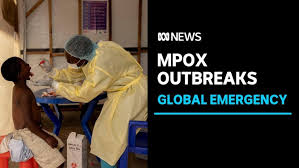
Introduction global
In July 2022, the World Health Organization (WHO) declared mpox, previously known as monkeypox, a Public Health Emergency of International Concern (PHEIC). This designation, the highest level of alert issued by the WHO, underscores the severity and global implications of the outbreak. This essay examines the reasons behind the WHO’s decision, the current state of the mpox outbreak, and the implications for global health.
Table of Contents
Understanding Mpox
Mpox is a viral zoonotic disease caused by the mpox virus, a member of the Orthopoxvirus genus. The virus was first identified in monkeys in 1958, hence the name, but the first human case was documented in the Democratic Republic of the Congo in 1970. Mpox is characterized by fever, rash, and swollen lymph nodes, and can lead to more severe complications such as pneumonia or encephalitis in some cases.
Traditionally, mpox has been confined to Central and West Africa, where it was considered endemic. The virus typically spreads through direct contact with infected animals or humans, or through contaminated materials. However, recent outbreaks have demonstrated a concerning shift in the virus’s geographic distribution and transmission dynamics.
Reasons for the WHO’s Declaration
- Unprecedented Global Spread:
The recent outbreak of mpox has been notable for its rapid and widespread dissemination beyond the traditional endemic regions. Since May 2022, cases have been reported in over 100 countries, with significant transmission occurring in areas with no previous history of mpox. This global reach highlights the virus’s potential to spread widely and rapidly, raising concerns about its control and containment. - High Incidence in Non-Endemic Areas:
The outbreak has predominantly affected non-endemic countries, particularly in Europe and the Americas. In these regions, the spread has been unusual, often among networks of men who have sex with men (MSM), though it is not exclusive to this group. The rapid increase in cases in these previously unaffected areas suggests that the virus may be adapting to new transmission routes or hosts, complicating containment efforts.
- Healthcare System Strain:
The surge in mpox cases has placed a considerable strain on healthcare systems worldwide. Hospitals and clinics are facing challenges in managing cases, particularly in areas with limited resources or experience with such outbreaks. The increase in demand for diagnostic testing, medical care, and vaccination has highlighted gaps in preparedness and response. - Public Health Risk:
The international spread of mpox poses a significant public health risk due to the virus’s potential for continued transmission. The rapid expansion of the outbreak in various regions has increased the likelihood of further mutations and adaptations, which could affect the virus’s behavior and impact. Additionally, the possibility of sustained transmission chains and the emergence of new cases in vulnerable populations exacerbate concerns. - Prevention and Control Challenges:
Effective prevention and control measures are crucial for managing the mpox outbreak. However, there are challenges related to the availability of vaccines and treatments, public awareness, and the implementation of preventive strategies. The WHO’s declaration serves as a call to action for governments and health organizations to strengthen their responses and coordinate efforts to curb the spread of the virus.
Current State of the Mpox Outbreak
As of August 2024, the mpox outbreak has continued to evolve. Efforts to control the spread of the virus have been met with varying degrees of success. Several key developments include:
- Vaccination Efforts:
Vaccination campaigns have been a central component of the response to the outbreak. The smallpox vaccine, which is effective against mpox due to the similarity between the two viruses, has been used to immunize at-risk populations. However, challenges remain in ensuring adequate vaccine distribution and addressing vaccine hesitancy. - Treatment Advancements:
Research into effective treatments for mpox is ongoing. While antiviral medications such as tecovirimat (TPOXX) and brincidofovir have shown promise, their availability and accessibility are still limited. Continued research and development are needed to enhance treatment options and address potential resistance.
- Public Health Initiatives:
Public health initiatives have focused on increasing awareness, improving diagnostic capabilities, and implementing preventive measures. Efforts have been made to educate the public about the signs and symptoms of mpox, promote safe practices, and ensure timely reporting and isolation of cases. - Surveillance and Monitoring:
Enhanced surveillance and monitoring systems have been established to track the spread of the virus and identify new cases. These systems play a crucial role in understanding the epidemiology of the outbreak and guiding public health responses.
Implications for Global Health
The WHO’s declaration of mpox as a global health emergency carries several important implications:
- Enhanced International Collaboration:
The declaration emphasizes the need for coordinated international efforts to address the outbreak. Countries must work together to share information, resources, and expertise to effectively manage and contain the spread of mpox. - Strengthened Health Systems:
The outbreak highlights the importance of robust health systems and preparedness plans. Investments in healthcare infrastructure, surveillance, and response mechanisms are crucial for managing current and future public health emergencies. - Increased Funding and Support:
The declaration may lead to increased funding and support for research, vaccination, and treatment efforts. Financial resources are essential for accelerating the development of new interventions and ensuring equitable access to healthcare services. - Global Health Security:
The mpox outbreak underscores the need for global health security measures to prevent and respond to emerging infectious diseases. Strengthening international regulations, surveillance systems, and response frameworks are key to mitigating future threats.
Conclusion global
The WHO’s designation of mpox as a global health emergency reflects the serious and multifaceted nature of the outbreak. With its rapid spread, significant public health implications, and the challenges of prevention and control, the situation demands a concerted global response. Addressing the outbreak requires enhanced international collaboration, investment in health systems, and ongoing research and development. As the situation continues to evolve, the global community must remain vigilant and committed to managing the outbreak and mitigating its impact on public health.









